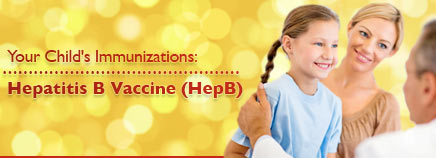
Hepatitis B virus affects the liver. Those who are infected can become lifelong carriers of the virus and may develop long-term problems, such as cirrhosis (liver disease) or cancer of the liver.
Immunization Schedule
Hepatitis B vaccine (HepB) usually is given as a series of three injections:
- shortly after birth
- at 1–2 months of age
- at 6–18 months of age
If the mother of a newborn carries the hepatitis B virus in her blood, her baby must receive the vaccine within 12 hours after birth, along with another shot — hepatitis B immune globulin (HBIG) — to immediately provide protection against the virus. If a newborn’s mother shows no evidence of the virus in her blood, the baby can receive the HepB vaccine within 24 hours after birth.
Why the Vaccine Is Recommended
The HepB injection usually creates long-term immunity. Infants who receive the HepB series should be protected from hepatitis B infection not only throughout their childhood but also into their adult years.
Eliminating the risk of infection also decreases risk for cirrhosis of the liver, chronic liver disease, and liver cancer. Young adults and adolescents also should receive the vaccine if they did not as infants.
Possible Risks
There is a very small chance of an allergic reaction with any vaccine. Serious problems associated with receiving the vaccine are rare. Problems that do occur tend to be minor, such as mild fever and soreness or redness at the injection site.
When to Delay or Avoid Immunization
The vaccine is not recommended if your child:
- is currently sick, although simple colds or other minor illnesses should not prevent immunization
- had a severe allergic reaction (anaphylaxis) after a previous dose of the vaccine or is allergic to baker’s yeast
Caring for Your Child After Immunization
The vaccine may cause mild fever and soreness or redness in the area where the shot was given. Check with your doctor to see if you can give either acetaminophen or ibuprofen for pain or fever and to find out the appropriate dose. Very young infants should not be given either of these medicines.
When to Call the Doctor
- Call if you’re not sure of the recommended schedule for the HepB vaccine.
- Call if you have concerns about your own hepatitis B carrier state.
- Call if moderate or serious side effects appear after your child has received a HepB injection.

